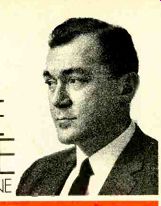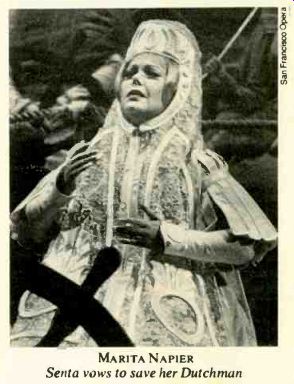
by WILLIAM LIVINGSTONE
SAN FRANCISCO FIRSTS
JUST as most people are sentimental about life's various "firsts"--the first date, the first apartment or home of one's own, the first love affair--I am sentimental about my operatic firsts. The first fully staged professional opera performance I ever saw was La Travia ta at the old Met. I now live in New York, the Met is my friendly neighborhood opera company, and I feel a strong emotional tie to the company. But I also have a similar attachment to the San Francisco Opera Company.
In a couple of seasons in the early Fifties I heard many great singers and saw a number of operas for the first time in San Francisco-my first Turandot (Inge Borkh and Roberto Turrini), my first Barber of Seville (Enzo Mascherini and Barbara Gibson), and my first Tristan and Isolde (Gertrude Grob-Prandl and Ludwig Suthaus). The last two were on the same day, and I thought Tristan would never die and let us hear the Liebestod.
I've gone back to San Francisco as often as I could, and in 1974 I again managed to collect two firsts in one day-my first performance of Rossini's Cenerentola (a witty production by Jean-Pierre Ponnelle with Frederica von Stade in the title role) and my first of Massenet's Esclarrnonde with Joan Sutherland and Giacomo Aragall.
The schedule for the company's 1975 sea son listed no operas I'd never seen, but the repertoire was varied and interesting, the roster of singers fascinating--Caballe, Scotto, Sutherland, Te Kanawa, Vishnevskaya, Carreras, Domingo, MacNeil, Pavarotti, Talvela, and Wixell, just to name some of the most fa mous ones. There were many tempting operas and casts, but what attracted me most power fully was Verdi's Il Trovatore with Joan Sutherland and Luciano Pavarotti assuming the roles of Leonora and Manrico for the first time.
The more I thought about those Trovatores, the more underprivileged I felt, until I finally made a list of all the other reasons I should go to California and concluded that a trip to the West Coast was clearly necessary. I cunningly timed things so that I was in San Francisco on a weekend when I could catch a Trovatore and two of the new productions, Wagner's Der Fliegende Hollander and Monteverdi's L Incoronazione di Poppea.
Early opera is not really my thing, and Poppea is very early--1642. An extremely vulgar production of it I saw at the New York City Opera had made the work even less my thing, but in San Francisco it afforded not only plea sure but delight. The handsome production, designed by Ita Maximowna, directed by Glinther Rennert, and conducted by Raymond Leppard, was a surprise hit of the 1975 season.

MARITA NAPIER-- Senta vows to save her Dutchman
Darkly beautiful and suitably voluptuous, Tatiana Troyanos sang and acted the role of Poppea with ease and authority, and although Eric Tappy doesn't look anything like my idea of Nero, he sang well. Beverly Wolff (Ottavia) and Richard Stilwell (Ottone) were impressive, and Maureen Forrester, whom I think of as that grim pessimist Erda in Wagner's Ring or a figure of baleful dignity in end less oratorios, revealed an unsuspected comic flair. She was very funny, and the comic scenes were handled with taste and wit.
I leave it to musicologists to argue about the appropriateness of Leppard's edition of Poppea. You can get an idea of what he has done by comparing the Glyndebourne recording on Seraphim with a new Telefunken set conduct ed by Nikolaus Harnoncourt, which is longer and more "authentic." I merely wish to re port that the Leppard version in the San Francisco production really pleased this member of the modern audience.
I was somewhat less pleased by the tinkering with Wagner's Flying Dutchman. Ponnelle, the designer and director, borrowed a flaw from a lesser work, Korngold's Die Tote Stadt, and reinterpreted Dutchman so that the important action takes place in a dream. The tenor roles of Erik and the Steersman are combined; the Steersman falls asleep in Act I and dreams everything that happens between the Dutchman and Senta. It is all played with out intermission on Daland's ship, a spectacular set with wonderful rolling waves. Although Ponnelle gets high marks for some very ingenious directorial touches and for the surrealistic aura of the dream, I found it anti climactic to discover at the end that the Dutchman is not really a tortured soul and Senta is not really a noble, self-sacrificing woman. This robs the work of much of its dramatic impact.
Still, the performance had great vitality, and I'm glad I saw it. Kenneth Schermerhorn conducted well, and I liked all the singers: Marius Rintzler (Daland), William Lewis (Steersman and Erik), Theo Adam (Dutchman), Donna Petersen (Mary), and Marita Napier (Senta).
The real thrill of that weekend was the Trovatore. I have to say that the production is one of the least attractive I've seen in San Francisco, the performance was a bit spotty and slow to get off the ground, Sutherland didn't seem really involved until the third act, Pavarotti's voice sounded lighter in this role than I had expected, and Richard Bonynge conducted certain scenes with a moving pulse and then lapsed into slow tempos for some of Sutherland's solos. No matter. Despite these flaws, there was a lot of excitement and some glorious singing from all four principals. Ele na Obraztsova (Azucena) and Ingvar Wixell (Count di Luna) are splendid singing actors, and they, along with Sutherland and Pavarotti, raised enough goose pimples to make that performance worth the transcontinental trip.
ACCORDING to Arthur Bloomfield's book Fifty Years of the San Francisco Opera, the company has given more performances than any other in America outside of New York. Among the many firsts it can claim are the American premieres of such operas as Jani Eek's Makropoulos Case, Orff's Die Kluge, and Strauss' Die Frau ohne Schatten and the American operatic debuts of a great many major singers, including Sena Jurinac, Birgit Nilsson, Leonie Rysanek, Pilar Lorengar, Renata Tebaldi, Mario del Monaco, and Leontyne Price. Miss Price (interviewed elsewhere in this issue) made her debut in 1957 in Poulenc's Les Dialogues des Carmelites, and she sang about half a dozen of her roles, such as Aida, for the first time in San Francisco.
London Records has put together an excel lent tribute to the company, "San Francisco Opera Gala" (OSA 1441), a four-disc anthology presenting outstanding singers in recorded excerpts from roles they have performed in San Francisco. The notes include a complete list of the company's repertoire from 1923 through 1972. And the history of the company is detailed--with all its "firsts"--in Bloomfield's book, which can be ordered from the San Francisco Book Co., 2311 Fillmore Street, San Francisco, Calif. 94115, for $14.95 plus 50 cents postage.
Also see:
AUDIO QUESTIONS and ANSWERS--Advice on readers' technical problem
Source: Stereo Review (USA magazine)